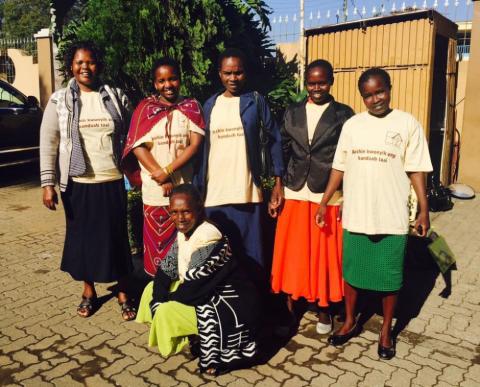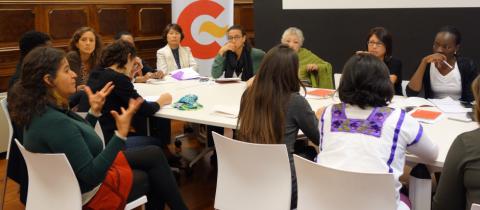
Housing, Land and Natural Resources
International human rights standards provide a foundation for women’s rights related to housing, land and natural resources (HLNR), but substantial legal, structural and social barriers continue to prevent women from enjoying substantive equality in relation to these rights.
See our #WomenLeadOnLand video series for testimonies by grassroots women leaders of social movements struggling for land, housing and natural resource rights!
Current collective work to advance the enjoyment of women’s economic, social and cultural (ESC) rights related to HLNR includes collaborating with the Strategic Litigation Working Group on the precedent-setting Endorois indigenous land rights case to ensure that women are central to implementation, and decision-making on land issues; collaborating with the Corporate Accountability Working Group in ensuring that the emerging treaty on human rights and business includes a strong gender analysis attentive to the disproportionate impacts experienced by women in connection with large-scale extractive and development projects; and facilitating women’s leadership and gender analysis in confronting a proposed large-scale development project in the Philippines. More broadly across the network, members are advocating for a new General Comment by the UN Committee on Economic, Social and Cultural Rights (CESCR) that would provide further guidance to States regarding their human rights obligations relating to land. Previously, ESCR-Net members advocated for and offered inputs into CEDAW General Recommendation No. 34 on the rights of rural women.
Endorois women at the women’s workshop in Nakuru, Kenya in August 2016
This collective work builds on strategic analysis by the WESCR WG over the last several years, focused on member identification of and response to key factors in the realization of women’s rights related to HLNR. These include inadequate, discriminatory or poorly implemented legislative and policy frameworks; challenges in accessing justice for human rights violations; barriers to women’s equal access, use and control of HLNR due to adverse impacts of customary law and culture, religion and societal gender constructs; tenure insecurity and related human rights violations, in the face of macro-economic policies that benefit corporate interests or in conjunction with development models that ignore the primacy of human rights; the significance of intersectionality and the interrelatedness of HLNR and other human rights; and the continued repression of women human rights defenders working on HLNR issues.- See the Working Group’s briefing paper on the intersection between land and women’s economic, social and cultural rights
- See the Working Group’s mapping report on women’s rights related to HLNR – covering the relevant international framework, key obstacles to the realization of human rights related to HLNR, current member work, positive developments, and identified opportunities for collective work.
This analysis has also been informed by capacity building workshops (Mexico City, November 2014 and Nairobi, June 2015), and an international strategy meeting (Montevideo, August 2015). In addition, WESCR WG members led a joint briefing (Geneva, November 2015) with members of CESCR and the Committee on the Elimination of All Forms of Discrimination Against Women (CEDAW) aimed at advancing women’s ESC rights and substantive equality, including in relation to HLNR.

